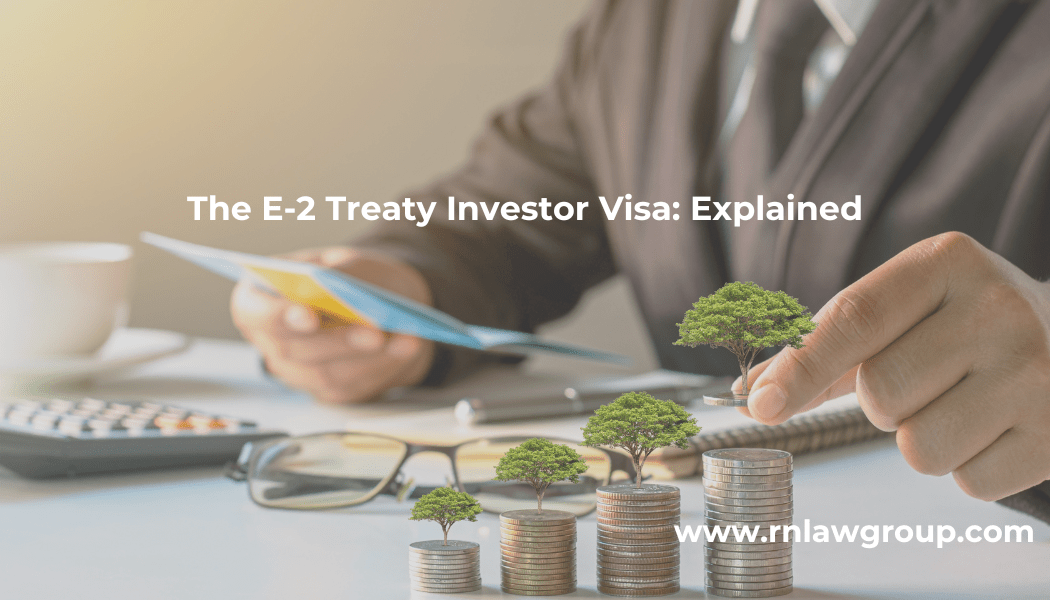
The E-2 Treaty Investor Visa: Explained
Introduction to the E-2 Visa
The E-2 Treaty Investor Visa is a nonimmigrant visa that allows nationals of certain treaty countries to enter and work in the United States based on a significant investment in a U.S. business. This visa is particularly popular among entrepreneurs and business owners who wish to expand their operations or start a new enterprise in the U.S. Unlike other business-related visas, the E-2 visa does not have a fixed maximum duration but instead can be renewed indefinitely as long as the business remains operational and meets the visa requirements.
Eligibility Requirements
To qualify for an E-2 visa, an applicant must meet several key requirements:
- Nationality: The applicant must be a national of a country that maintains a qualifying treaty of commerce and navigation with the U.S. The list of eligible countries is determined by the U.S. Department of State.
- Substantial Investment: The applicant must have invested, or be in the process of investing, a substantial amount of capital in a bona fide U.S. enterprise. While there is no fixed minimum investment amount, the capital must be enough to ensure the successful operation of the business.
- Control of the Investment: The investor must own at least 50% of the business or possess operational control through a managerial position.
- Real and Operating Business: The business must be an active, for-profit enterprise that is operational or on the verge of commencing operations. Passive investments, such as purchasing real estate without active management, do not qualify.
- Intent to Depart: The applicant must demonstrate an intent to depart the U.S. once their E-2 status ends. However, they are not required to maintain a residence in their home country.
The Application Process
Applying for an E-2 visa involves several steps, depending on whether the applicant is applying from within the U.S. or at a U.S. consulate abroad.
Step 1: Business Formation and Investment
Before applying, the investor must establish or acquire a business in the U.S. This includes:
- Registering the business entity (LLC, corporation, etc.)
- Securing necessary licenses and permits
- Renting office space and setting up business operations
- Transferring investment funds and making expenditures related to the business
Step 2: Compiling Required Documentation
Applicants must prepare and submit a comprehensive E-2 visa application package, which includes:
- Business plan detailing investment strategy, projected financial growth, and employment creation
- Proof of substantial investment
- Financial statements of the business
- Lease agreements, supplier contracts, and operational agreements
- Passport and any prior U.S. visa documentation
Step 3: Filing the Application
If applying from outside the U.S., the applicant submits the E-2 visa application to the U.S. consulate in their home country. If applying from within the U.S., the application is filed with U.S. Citizenship and Immigration Services (USCIS).
Step 4: Attending the Visa Interview
Once the application is reviewed, the investor is required to attend a visa interview at a U.S. embassy or consulate. During the interview, the consular officer will evaluate the legitimacy of the investment and the applicant’s role in the business.
Duration and Renewals
The initial validity period of an E-2 visa varies depending on the applicant’s country of origin but typically ranges between one and five years. However, investors can apply for unlimited renewals as long as the business remains active and continues to meet E-2 requirements.
Each time an E-2 visa holder enters the U.S., they are generally granted a two-year period of stay. Extensions can be requested while in the U.S., or by renewing the visa at a U.S. consulate abroad.
Advantages of the E-2 Visa
- No Fixed Investment Threshold: Unlike other visas such as the EB-5 immigrant investor visa, the E-2 visa does not require a specific minimum investment.
- Indefinite Renewals: As long as the business remains operational, investors can renew their visa multiple times.
- Work Authorization for Spouses: E-2 dependent spouses can apply for work authorization in the U.S., providing them with greater flexibility.
- Faster Processing Times: E-2 visa applications are generally processed faster than immigrant investor visas.
- No Fixed Cap or Quota: Unlike H-1B visas, the E-2 visa is not subject to annual numerical limits.
Challenges and Limitations
- Limited to Treaty Countries: Nationals of non-treaty countries (e.g., China, India, Russia) are not eligible.
- Nonimmigrant Status: The E-2 visa does not provide a direct path to a green card, although investors may explore other avenues such as the EB-5 visa.
- Investment at Risk: The investment must be at risk, meaning that personal funds should be committed before the visa is granted.
- Subject to Changes in Treaty Relations: If a country loses its treaty status with the U.S., E-2 visa holders from that country may lose eligibility for renewals.
Transitioning from an E-2 Visa to a Green Card
Although the E-2 visa itself does not lead directly to a green card, investors can explore alternative immigration pathways, such as:
- EB-5 Immigrant Investor Visa: By increasing the investment amount to at least $800,000 (for targeted employment areas) or $1,050,000 (standard investment), an E-2 investor may qualify for a green card.
- Employment-Based Green Cards (EB-1, EB-2, EB-3): If the investor qualifies under another employment-based category, they can apply for permanent residency.
- Marriage to a U.S. Citizen: E-2 visa holders who marry a U.S. citizen may apply for a green card through family sponsorship.
Conclusion
The E-2 Treaty Investor Visa is an excellent option for entrepreneurs seeking to establish and manage a business in the U.S. without the commitment of permanent residency. It provides numerous benefits, including renewable status, work authorization for spouses, and no fixed investment minimum. However, it comes with limitations, such as nonimmigrant status and eligibility restrictions based on nationality.
For individuals considering the E-2 visa, careful planning, a well-structured business plan, and professional legal guidance can significantly enhance the chances of a successful application and long-term business success in the U.S.
By: Felipe Jimenez
Felipe Jimenez is an Associate Attorney at Reddy Neumann Brown PC. He works in the Non-Immigrant Visa (NIV) Department where he assists clients through all phases of the non-immigrant visa process.
Reddy Neumann Brown PC has been serving the business community for over 20 years and is Houston’s largest immigration law firm focused solely on US. Employment-based immigration. We work with both employers and their employees, helping them navigate the immigration process quickly and cost-effectively.

